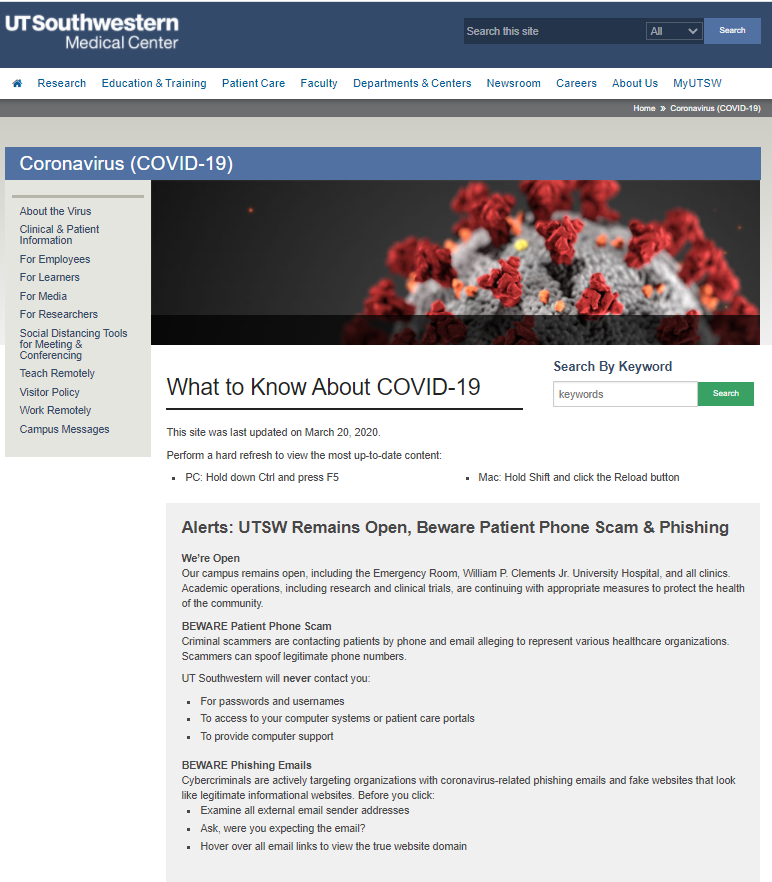The COVID-19 pandemic has uprooted much of life as we knew it over the past months, and this period of time will surely be of interest to researchers in the future. That’s why we at the UT Southwestern Special Collections and Archives have been actively collecting materials related to UT Southwestern’s response to the pandemic. Though the first things that might come to mind when you think of archives are record boxes and printed photographs, much of today’s historical records live solely in digital form. The material documenting the COVID-19 outbreak is no exception, and it is vital that we actively collect this material to preserve it for the future.
Born-digital materials are considered a higher preservation risk because they are subject to corruption (called “bit rot”) and obsolescence (being unable to open files due to unsupported software or file formats). They are also at risk of simply being forgotten about when a staff member retires or files are buried on a computer. Actively collecting born-digital material as they are created is one of the most important steps in preserving these digital records over time.
We have begun collecting a number of different records relating to COVID-19 over the past few months. One of the more valuable digital records currently for the campus is Dr. Podolsky’s weekly and now bi-weekly podcast series, where he discusses the current state of the campus and answers community questions. Though these podcasts and the transcripts are currently available on the UT Southwestern website, there may be a time years from now that the COVID-19 resources page no longer exists. We have been collecting both the audio files and the transcripts to ensure they are preserved in the University Archives.
Lots of today’s information is disseminated through emails, which is why we have also been collecting the daily Emergency Operations Center COVID-19 Update emails. We save the update emails each week in PDF format, and each month we export the emails as a Microsoft Outlook email file (called PST). This allows us flexibility in how we can provide access to the emails in the future, and also ensures that they are in stable file formats that will probably be accessible over time.
During a public emergency such as a pandemic, information is changed and updated frequently so that the most up-to-date information is available. We are working to capture each bit of information as it comes to show the changes over time. One way to do this is to capture websites at a fixed interval so that changes made to the website can be seen. The UT Southwestern Special Collections and Archives became Archive-It members at the beginning of the pandemic to streamline the capture and preservation of websites. If you aren’t familiar with Archive-It, you may be familiar with the Internet Archive’s Wayback Machine, which is a similar tool that allows for the capture and playback of websites. We are crawling many UT Southwestern COVID-19 related websites and social media posts on a weekly to monthly basis. We are also downloading the COVID-19 Forecasting Models as they are updated. These materials collectively can help tell the story of the spread of COVID-19 in Dallas and how UT Southwestern responded.

Once the material is in the University Archives, we work to ensure its longevity in a number of ways. First, we ensure that we have multiple copies saved in different locations, so that no copy is dependent on another, and we can recover information if it is lost or corrupted. We also try to stabilize file formats into formats that are better for preservation. Finally, just like any other analog collection, we arrange and describe the collection so that researchers can find information that is of interest to them.
Collecting digital records relating to COVID-19 as they are created ensures that they can be preserved and made accessible to researchers in the future. If you or your department has any digital material relating to COVID-19 that might be of interest to us in the archives, please reach out to Kaitlyn Sisk, Digital Archivist, or Chianta Dorsey, University Archivist, at archives@utsouthwestern.edu.
